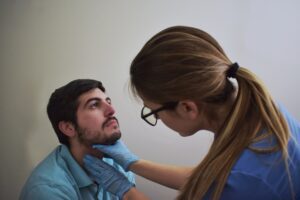

Call Us Today
(828) 505-7033
Email Us
info@advancedoccmed.com
Visit Us
1550 Hendersonville Rd Suite 200 Asheville, NC 28803
In observance of the holiday season, Advanced OccMed will be closed on the 23rd-27th and the 1st of January.

(828) 505-7033
info@advancedoccmed.com
1550 Hendersonville Rd Suite 200 Asheville, NC 28803

Welcome to the Advanced OccMed blog! In this post, we will discuss the importance of the yellow fever vaccine for travelers. As a trusted provider of occupational medicine, we understand the significance of protecting against yellow fever, a potentially dangerous disease transmitted by mosquitoes in certain regions. Read on to learn about the yellow fever vaccine, its administration, travel requirements, and more.
Yellow fever is a viral infection transmitted by the bite of infected mosquitoes. It primarily affects tropical regions of Africa and South America. Symptoms of yellow fever can range from mild to severe and may include fever, headache, muscle pain, nausea, and jaundice. In severe cases, it can lead to organ failure, hemorrhage, and even death.
The yellow fever vaccine is a safe and effective way to protect against the disease. It is a live attenuated vaccine, meaning it contains weakened forms of the virus that stimulate an immune response without causing illness. The vaccine stimulates the body’s immune system to produce protective antibodies, providing immunity against yellow fever.
To receive the yellow fever vaccine, individuals should visit a healthcare provider or a designated yellow fever vaccination center. The vaccine is typically administered as a single dose through a subcutaneous injection. It is important to receive the vaccine at least 10 days before traveling to allow sufficient time for the immune response to develop.
The yellow fever vaccine is highly effective, providing long-lasting immunity. A single dose of the vaccine is generally considered sufficient to confer immunity for a lifetime. However, some countries may require booster doses after a specified period to ensure ongoing protection.
Many countries require proof of yellow fever vaccination as a condition for entry, especially if the traveler has recently visited a yellow fever-endemic region. Failure to provide a valid yellow fever vaccination certificate may result in denial of entry or quarantine measures. It is crucial to check the travel requirements and recommendations of your destination well in advance.
The yellow fever vaccine has a good safety profile. Common side effects include mild fever, headache, and muscle aches, which usually resolve within a few days. Severe adverse reactions are rare. Individuals with specific medical conditions or compromised immune systems should consult their healthcare provider before receiving the vaccine.
In addition to vaccination, there are other preventive measures travelers can take to minimize the risk of yellow fever. These include using mosquito repellents, wearing long-sleeved clothing, and staying in accommodations with proper mosquito protection. It is important to stay informed about travel advisories and updates related to yellow fever outbreaks.
Certain populations require special consideration when it comes to yellow fever vaccination. Pregnant women, infants, individuals with compromised immune systems, and those with specific medical conditions should consult their healthcare provider for personalized advice. The risks and benefits of vaccination should be carefully evaluated in these cases.
Protecting against yellow fever is crucial for travelers visiting regions where the disease is endemic. The yellow fever vaccine offers effective and long-lasting immunity, reducing the risk of infection. To ensure a safe and hassle-free journey, it is essential to understand the travel requirements and recommendations, consult healthcare professionals, and take necessary precautions. At Advanced OccMed, we prioritize your health and safety. Contact us or your healthcare provider for personalized advice and vaccination before embarking on your travel adventure.
We hope this blog post has provided valuable insights into yellow fever vaccination and travel requirements. Stay informed, stay protected, and have a healthy journey!
Yellow fever is a viral infection transmitted by mosquitoes in certain regions of Africa and South America. It can cause symptoms ranging from mild to severe, including fever, headache, muscle pain, and jaundice.
The yellow fever vaccine is essential for travelers visiting regions where the disease is endemic. It provides protection against yellow fever and may be required for entry into certain countries.
The yellow fever vaccine is administered as a single dose through a subcutaneous injection. It is typically given at least 10 days before travel to allow the immune response to develop.
Yes, the yellow fever vaccine is highly effective. A single dose is generally considered sufficient for lifelong immunity. However, some countries may require booster doses after a specific period.
Most individuals experience only mild side effects, such as fever, headache, and muscle aches, which resolve within a few days. Severe adverse reactions are rare.
Many countries in Africa and South America require proof of yellow fever vaccination as a condition for entry. It is important to check the specific requirements of your destination before traveling.
Yes, in addition to vaccination, travelers should use mosquito repellents, wear long-sleeved clothing, and stay in accommodations with proper mosquito protection. Staying informed about travel advisories is also important.
Yes, certain populations, such as pregnant women, infants, individuals with compromised immune systems, and those with specific medical conditions, should consult their healthcare provider for personalized advice.




